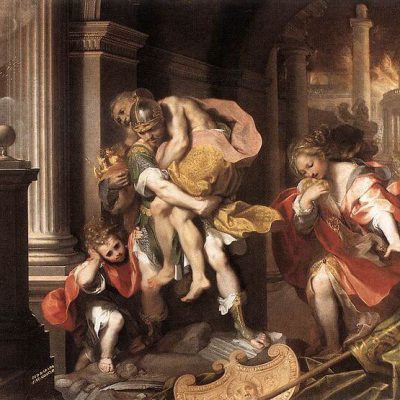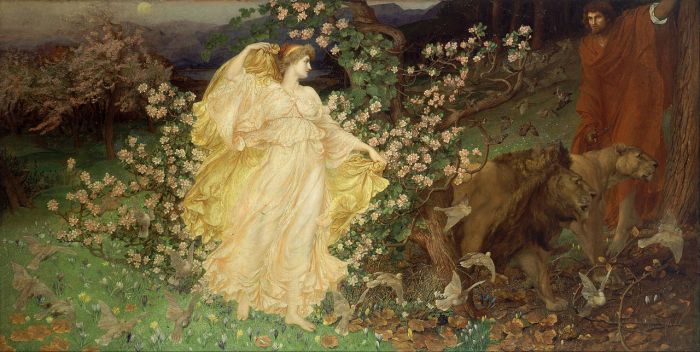Chapters
Aeneas was a Trojan hero in Greek and Roman mythology. He was one of the few people who managed to avoid the slaughter in Troy and, along with Hector, one of the bravest defenders. That night, when the Greeks, with the help of a wooden horse, invaded Troy and began a bloody slaughter, Aeneas, son of Venus and Anchizes, had a sinister dream. Hektor stood in front of him and ordered him to flee.
Escape from Troy
When he woke up he tried to fight, but in vain. Resigned, he hurried home to save his family from death: Father Anchizes; wife to Kreuza and son Askanis (later founder of the city of Alba Long). Along the way, he met the hidden Helena, whom he wanted to kill. In time, however, Venera appeared and led him away from this act.
When the hero reached his home, he tried to convince his father to escape, but to no avail. Anchizes changed his position only when above the head of Askanisa saw a bright light and a star falling from the sky. The family started their escape. Aeneas carried his weak father, his son ran next to him and his wife behind them. When the hero reached the hill below the city he noticed that his wife was lost somewhere in the city. He decided to go back and look for her, but he found only her spirit in the city.
The desperate hero returned to the hill, where a crowd of fugitives gathered seeking shelter. At dawn, led by the hero, everyone reached Idy, where, having built ships and gathered all the holy relics, they set off.
The gods promised Aeneas a new homeland, but they gave her the place so mysteriously that it was not known where to look for her. In addition, the Trojans’ journey was hampered by Juno, who still did not forgive Paris for the offence and took revenge on her for all Trojans.
This is how the long journey began. Aeneas wandered the seas and foreign lands for many years, unable to find shelter anywhere.
Departing from the shores of Troy, Aeneas, at the head of the fleet, set off towards Thrace, the ally of Troy. The hero decided that it was on this land that he settled and founded the city. But behold, the figure of Polidor, son of Priam, appeared before him. This here told him how the Thracian king sneakily murdered him, thereby betraying his allies. Warned by the ghost of Polidor, Aeneas gathered his bridesmaids and sailed away.
After a long journey, the Trojans arrived at the holy island of Apollo. There, Aeneas consulted the holy oracle, which told him to sail to the land of his ancestors, which was Crete. Having arrived there, the Trojans built a stronghold, which they called Pergam. However, in a short time, a terrible plague appeared in the settlement, which consumed many people and animals. On the advice of Aeneas, everyone left the island and went on a journey.
After three days and three nights of uninterrupted travel during terrible storms, Aeneas’ ships reached the Strfad Islands, where harpies, female monsters, lived. From one of them, he learned that he was to sail west, and he would know the promised land after such hunger would suffer, that even the tables would eat.
Queen of Dido
Aeneas set off again. When he noticed the African shores, he decided to enter the Carthaginian port. A new big city, raised from scratch, appeared to the eyes of the newcomers. Its builders were exiles from the city Tyre in Phenicia, who due to internal struggles had to leave their homeland and look for a new homeland. Carthage was ruled by the beautiful queen Dido, who was a widow. The ruler invited the hero to a feast to tell her about the destruction of Troy and his own adventures. Throughout the feast, Dido kept on her lap a small Askanisa, who scratched the queen around the heart. In fact, however, he was not the son of Aeneas, but Amor, who caused the queen to fall in love with Aeneas1. From that moment she organized feasts and hunts to keep her beloved with her. However, one night, Aeneas received a message from the gods that Carthage was not the end of his journey. The Trojan decided to leave the city and sail away. Dido from despair after the departure of Aeneas broke through the sword, previously cursing Aeneas. This was the beginning of the eternal hatred of Rome and Carthage.
After a few days of sailing, sailing north, Aeneas reached Sicily, where old Anchises had already died and then reached Italy. Trojans landed near the city of Cumae, in the Gulf of Naples. Near this place, there were gates to the underground world. The hero took the opportunity and visited the afterlife, where he met his father, Anchizes, who showed him people who have already died but also those who were yet to be born. In addition, Aeneas saw the entire history of Rome up to the time of Emperor Augustus. Encouraged by the vision of his homeland, the hero set off north.
Italia – new homeland
After reaching the place where the Tiber flows into the sea, they decided to rest and feed on land. There was only one oak and some grass under it. They sat down and laid out dry and hard wheat-like cakes on it, and the fruit they began to eat on it. Aeneas, remembering the prophecies about the tables, knew that this was his promised land.
The state in which they settled was Latynus. His headquarters was in the town of Laurentum. It was at this time that preparations for the wedding of his daughter, Lavinia, were underway. It was to be handed over to the leader of the Rutul tribe – Turnus. And that day, when Aeneas arrived, he dreamed of a dream to King Latinus, in which his father, Faun, ordered to extradite Lawina for a foreigner. Descendants born of this relationship were to rule over the whole world. According to the dream, when Aeneas appeared, he decided to give him his daughter’s hand. In addition, he allowed him to settle in his lands.
But the vengeful Juno, who had interfered with events many times before, thwarted these plans. First, Latynus’s wife, Amata, opposed the wedding, and then Turnus complained. The conflict between Rutulas and Trojans gradually increased. During the hunt, Aeneas’ son killed a deer, which was also hunted by one of Turnus’s shepherds. There was a fight that led to the first victims. The conflict turned into a war. Aeneas naturally took the side of Latina2. Seeing, however, the weakness of his army, in which there was no cavalry, he went to Euander for help. He gave the hero a superb driving unit under the command of his son, Pallas. In addition, the goddess Venera brought Aeneas the armour forged by Vulcan. There was a bloody battle, which ended the duels. First, Turnus killed Pallas, and then he himself was killed by Aeneas. The Trojan might not have killed Turnus, begging for mercy, but when he noticed his friend’s belt on his opponent’s hips, he was unscrupulous.
When Aeneas returned from the war, he married Lavinia and built the city of Lawinium in her honour. The Trojans together with the people of Latinus united into one people and formed a tribe of Latins. After Latinus’ death, Aeneas took power in the state. But four years later, a new war broke out with the Rutulas, during which Aeneas vanished without news. Some said that he drowned in the river, and others that Venera took Aeneas out of the confusion of fighting and took him to heaven. As a father, his son from the first marriage, Ascanius, named Julus, took over. His stepmother, sickly jealous of all Aeneas’ previous relationships, did not respect Ascanius. She tried to disturb his life in every possible way. Amata saw his life to such an extent that he decided to leave the city at the head of the rebellious youth. Wandering along the Tiber, they founded the city of Alba Longa, the cradle of Rome. According to legend, the famous Julia gens, whose representatives were patricians and notable citizens Rome, including Julius Caesar and Octavian Augustus.












